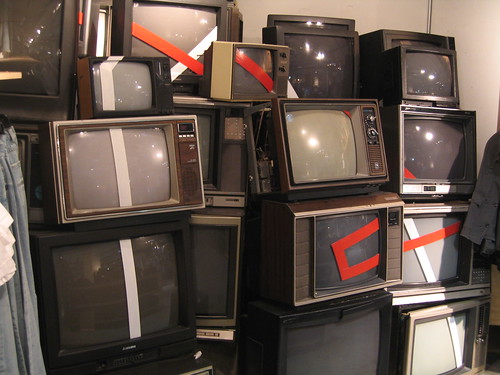 Rubbish. Every UK household produces over 1 tonne of it annually. And the stuff in our rubbish bins could power 5,000 hours of television every year. (does Audi TV have that much content?)
Rubbish. Every UK household produces over 1 tonne of it annually. And the stuff in our rubbish bins could power 5,000 hours of television every year. (does Audi TV have that much content?)Ethical consumerism seems to be all the rage at the moment. Blogging ahoy after Channel 4's attack on Global Warming.... Gordon Brown has started getting the tube, and UK political parties square up to a 'green-off'. (I'm sure their intentions are genuine, and not a ruse to reel in the floating voter. Not that I'm cynical or anything...)
Enough about politics, let's talk design!
Enlightened sections of the design industry are considering and incorporating social and environment externalities into sustainable design solutions. They're thinking: 'What is the true 'cost' from cradle to cradle?' (In other words the energy and resources used and the social impact to make something, distribute and sell it, use it - and recycle it to make something new.)
Today I went to the [re]design exhibition at the Bluebird Cafe in London. This exhibition shows work from 17 innovative British designers who are bringing sustainability into contemporary design. Chairs made of old plastic and supermarket cardboard, a bench made from old Euro bins, trainers made from old rubber and clothes, blinds made from old signs (my favourite), lamps made from old bottles. All made using sustainable processes.
A really fascinating piece was a bench made of old supermarket cardboard packaging from a chap called Jason Ifkahar. It seems he actually has an arrangement with Sainsbury's to use their waste in his designs, and they're looking for ways in which production levels could be increased.
Now, I haven't heard Sainsbury's talking about this - but this seems to be really positive CSR from an organisation doing something proactive, innovative and actually quite cool.
(Rather than green-washing a tired loyalty scheme, like some other supermarkets we could mention)















3 comments:
now maybe it's just me, but surely incentivising customers to reuse carrier bags is going to have a much larger impact (on the environment) than supplying some hip young thing with supermarket leftovers?
admittedly if it does take off and he starts producing IKEA-type volumes then perhaps I'll be proven wrong, but for my money, CSR - as well as saying the right thing - has to make a tangiable difference
i think [re]design is a great idea, but i wouldn't necessarily heap too much praise on sainsbury's yet.... there's much to be done still!
Fair point. I guess I'm thinking more about the sentiment behind some of these initiatives rather than the actual outcome (positive as it might be).
What's interesting to me is the fact that Sainsbury's are involved in something like this at a small local level and are not shouting about it. I.e. the genesis of the idea is less likely to be from a marketing plan.
For Tesco, it feels to me that they started from a marketing communications angle. i.e. what can we do that will:
a) give us something to shout about in ATL comms that is in vogue
b) give a boost to flagging ClubCard usage / penetration
c) cut down some costs (i.e. production of bags)
Bonus! Green points!
Maybe I'm doing them a dis-service, and the initiative did start from a desire to do something environmentally positive first, which became a marketing communications campaign later.
We will never be able to divorce the spectacle from the reality, and any telling of the Tesco story will naturally suggest that the agenda was always ethical.
But, in reality, anything that makes a positive difference (from whatever agenda it was born) is A GOOD THING.
absolutely agree with your final sentiment there.
you're right, Tesco could be slightly more creative, and the Sainsbury's idea is cool.
and you may well be right about Tesco's motivation (in fact, you almost certainly are) but, it's a sad truism that most (not all) companies still see green/ethical initiatives as marketing ploys as opposed to ideas to benefit the 'greater good'
a fundamental tenet of selfish capitalism, perhaps?
Post a Comment